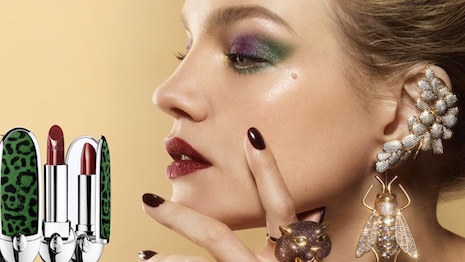By Milton Springut
As we step into 2024, uncertainty looms large over the luxury business, with executives preparing for a challenging year ahead.
The recently released McKinsey & Co.-The Business of Fashion report, “The State of Fashion 2024” (the “Report”) sheds light on key trends that will likely shape the industry's landscape in the year ahead.
Against a backdrop of geopolitical events, economic fluctuations and lingering high interest rates, according to the report, executives find themselves divided on their expectations for the year.
From the transformative potential of generative AI, the evolving dynamics of brand marketing and social media influencers, and the urgent need for sustainability strategies as a result of climate change, the luxury business faces a triad of challenges and opportunities in 2024.
Generative AI
The report emphasizes the rising significance of generative AI (Gen AI) in the luxury brands industry.
With 73 percent of executives planning to prioritize Gen AI in 2024, according to the report, the technology holds substantial potential for creativity-focused applications in design and product development.
Gen AI witnessed a significant surge in 2023, exemplified by the remarkable success of platforms such as ChatGPT and Midjourney.
For example, brands are using ChatGPT-based natural language-powered shopping assistants that allow visitors to ask questions and get answers or customized product recommendations.
Amazon is using AI-generated customer product review summaries on its homepage to help customers sift through the high volumes of reviews.
AI has the power to convert rough sketches into 3D designs, draft comprehensive research on brands, vendors and suppliers, accelerate marketing content creation such as copywrite drafts and campaign photoshoots, enhance customer service through virtual AI-assistants, provide real-time insights to assist managers and employees in retail locations, and even improve talent acquisition by streamlining candidate sourcing through algorithms that screen the best candidates.
As luxury companies experiment with Gen AI, legal considerations come to the forefront.
Brands leveraging Gen AI must tread carefully to safeguard intellectual property. With foundation models trained on massive amounts of Internet-sourced data, there is a risk of unintentional exposure to protected content.
Brands should also be vigilant about licensing terms when using third-party models, ensuring that their data and intellectual property are not misused.
Ethical considerations surrounding AI, such as bias mitigation, fair algorithms and data privacy need to be addressed as well to prevent legal repercussions and maintain consumer trust.
 The Guerlain 2023 Christmas campaign was among the more outstanding holiday efforts as the perfume brands up its game with product introductions, brand collaborations and eye-catching marketing as it heads into 2024. Image: copyright ARR, Guerlain
The Guerlain 2023 Christmas campaign was among the more outstanding holiday efforts as the perfume brands up its game with product introductions, brand collaborations and eye-catching marketing as it heads into 2024. Image: copyright ARR, Guerlain
Brand marketing and authentic influencers
The McKinsey report indicates a shift towards long-term brand-building strategies, particularly brand marketing.
With 71 percent of executives planning to increase spending on brand marketing – a trend that moves away from the metric-focused performance marketing – businesses are reorienting their playbooks to emphasize emotional connections with consumers.
Additionally, as consumers exhibit signs of fatigue towards traditional influencer marketing, brands are predicted to makes moves towards collaborating with a “new wave” of content creators that embrace a less-polished aesthetic, quirkiness, humor and vulnerability in contrast to proven and polished celebrities and mega-influencers that dominated brands’ attention in the past.
A significant majority, comprising 68 percent of consumers, express discomfort with the saturation of sponsored content across social media platforms. Additionally, 65 percent now place less reliance on fashion influencers than they did in preceding years.
As consumer preferences shift towards authenticity, ensuring that these fresh-faced influencers align with a brand's values and maintain transparency, it becomes a legal imperative to avoid potential contractual disputes and disastrous marketing mishaps.
The report shares that brands may need to show a willingness to relinquish a degree of creative control in working with these personalities in 2024. Nevertheless, legal teams should be involved in negotiating partnerships, emphasizing the sought-after authenticity, while minimizing potential risks to the brand’s image.
And as brands continue to delve into short videos and social media formats such as TikTok, legal diligence is crucial to ensure compliance with advertising standards.
Climate urgency and sustainability
The pressing concern highlighted in the report is the escalating climate crisis.
As extreme weather events impact all areas of the industry, such as the production of raw materials, executives are not only urged to adapt, but will likely be required.
Droughts in Argentina, United States and China led to a loss of more than $7.6 billion. Floodings across Asia forced temporary or permanent factory closures, and the impact is twofold, affecting not only the livelihoods but also the health and safety of factory workers.
Even with sustainability topping the C-suite agenda for only 12 percent of survey respondents, all businesses will be likely compelled to adopt both short- and long-term strategies to address these challenges.
From a legal standpoint, the fashion industry faces impending regulatory changes across the globe that seek to increase both environmental and social accountability.
In the U.S., the New York Fashion Sustainability and Social Accountability Act aims to hold major brands accountable for their environmental, social and governance impacts. Meanwhile, the European Union is actively discussing at least 16 pieces of legislation, with the first set to take effect in 2024.
Such regulations may require companies to disclose information about their supply chains, including mandates to transparency in supply chain practices to prevent human rights abuses and reduce a company’s impact on climate.
To navigate these changes, legal teams will need to proactively align business models with evolving regulations, ensuring compliance and minimizing legal risks.
IN THE FACE of uncertainty, the luxury business must not only adapt to emerging trends but also consider the legal implications associated with these changes.
From navigating sustainability regulations to harnessing the potential of Gen AI and redefining brand marketing strategies, legal teams will continue to play a pivotal role in guiding their enterprises through the challenges and opportunities that 2024 brings.
As the industry evolves, a proactive legal approach will be instrumental in ensuring compliance, protecting intellectual property, and fostering sustainable growth in a dynamic marketplace.
The views expressed in this article are purely the author's.
Milton Springut is partner at Moses Singer, New York. Reach him at mspringut@mosessinger.com.
{"ct":"5NFBt8ivgwPLL9Qa3Mf9BjnQJhIQXVvi+H7wMPgggNNe5YeDSAd3ck3eT1d7uG71FYOTPk21XWhG3+OqAfTnozqQ1MBL6dpsa+cCtXOOd\/tmDKidWZv\/BWYUVirBx0+T0qhn0yaCeFD2MCcQIjZO8ZqUmmJnhlvEqQ\/Zq8SNMOZko4jcbS7qqaz6l6x2sybqhtFPn8bT5Cuj5SsjxeNgLd95JbpXEXaVUnkSe8SDqnpmOHGuXeNBT1T5VnH8r1cBbR25cBL5OtHHIUMfzjZsq6HWXnfJlwFHJD4P7R5lvUZfSFZsDpM0qWs6U7fOuVQoXKnd2Bi9wyatIMjk2+uD+kI3H8x5HEX3bETpsO41xMSwToivm4sKQARMLrcjTK0rBuScskK8J86qXKuf6g227VBJJsWmrvmeEMyYS2cjhdzF\/7f8fTd1lCsJJjMzIUkezVuNlvyiKUs9M8BIwmI5q8f9qdLq2LHaiTIvbyyxdJm3NLi1G7ugSx1xQo7Silgbn1gFtS56OWsYQE9N3sBmNUhuk9X6+QWtC1GzU6Z1WD9bS9m8eD1y7u4rEFpGP9+UBBvNg8\/ViWF77fOQoGQNTQOcraoWgxCCjZhkrmPwz6z+MdfgtU+Ycepdvv7UsUlEaVuzIqSk1LiENfVbUn6oi3ItGzaPzDZ3rcSRJd+xN\/cvJhMAmqHCU4tOjhe1lE\/PNCU5fxTib8kWrtAAMNrpcqGm2LMaV6Xvfbesh2LH3iUVWF3\/Tz\/aUPYdUnxNaunRz31O4Csn+uPAu+tMIVN66l+qD5WF9tErmAxF67z5jR7TL\/ZWJ8KNlWch1yadoJCFDwbJCh6q5W6z97D8wMc9EUODwCN8nhZJZJJZ2E0nhXMdP7MGo6x9G2R6jxwFCYULwWK8yT2MaaTeEnz5yNgRF8Ttnynua9MgBjWkfDT8GipmTGurH3VXI3LhcQC\/O2vyQSr+VxiB0zBDLfqrCgTUvenzzzA1snm7eWENnGjF56WtZpHGfcq++cI\/lprZdiJ+b9mmIF29huelIzwGaWcyh8cetKoIkWuWBvuBXjoe1hSkNG\/42vq9J6Dg4C5vFfqzBKfZOR7wiNBMTc7MIYAshKuVrppK4ejvBxcQT3N1ltNnDxi9HqJu+rStjcQgApkzYTLzmxW4zlNRhaW1EUTJO7Yj\/T8mvWXcFFDEJBj9KQyKuxUsIhf2GqALXWZKpvXfl+25yFn1YI\/68RydWz\/uVyYY7dkHW1CEw0BCRHeluoKFYZXrtB8qQUzTr41wSf\/KsrfdmgBQWQWogxTjX9X1HzOVxGt+RiiOIsQR0V+UgyEYLuj+rpaPpo0Q8jtdedscl1dsbwZ7t4DrWlzf9M7nS4Dg+hJ8B9xhAGuu7bX5n7zEqQKvZz9Er3i6LKwiSOG1o29uSs1CEAPfHIoMHBWGzE7Ph9JTvzwlqKt7nZ\/y07wrSFBfksSNzPDlqRwn9Rmuv2xQH2ml742zgcSZy21ds26Hby7N6hcMHwroUZJ9QMcrgHu4YF5HyN8KWo6\/TtIJfpIrQvZdNV5JcA0hGVWw0Mb+8a9n+9d5NHUyEyxYJCIzVhw+6rUKq4mYFAxZQgmcRBY5RsCl8gUs9C1eDNOsfhlQ5\/4Vm4NeHsbTFSVQRUjl4nhcgNqiG5l810uphiOfBOwGKuCLkON5FNFkvCc7+ep0\/wD2m+jGpgkE4ViVmWEIBsFKt9GT+e4wjvj0wn9t+VWYVdXhW9iFEbGkXVzkoPH1wxBbn5BGv4SzBrHb5p0TcSq5CkK9lQINpmfCPGN8vBdTE7J0cq0l3vuYkyPkCQG07Kk3IPrlVscHKXd1ZsjdSCVbeAp3ibfwmA64fkhTLEep5nNwiT3mBrupSo7hXiV0QTKQRkbA5cy\/\/wl0iA9u\/Y9Ad1yv+bBe1mtxPo7l+Y5liL5NvHW5v9feYxzImkx4\/pTLbIr975EdQh8poGJzVgCgX3gGwi6pn8pQl0GC+ygqAvR0Hac4ZR9YPpXEtsyyohH7wg\/SU02kEjSBp9Kswx26L3u0kEpSdpnF+ocuSsGiNuXC6v7r\/eUb018aEs\/IWs2sMG3jpqbPVlCtXxCMxw+C3yM8PKdFY0q6ggawfIfrxgjDQXleQQ8f8F2xVcucpb5EpdzrmkHN87CxMMoBgG+vEkjINxzr17Iln5ktgg6X\/MYh7tOEBErd9lGJz7aZz\/KROTHjMqoQTOJCqpr+VKt50z2\/w39IwXudqEVUobgdydhEsC2C57KiAFEM5CpvopmrvCpA7+YXn89IYihxh73ve9PVqbjKS0UpvODMJIyJWMWwZRwGKzGzJEjLwjz\/4CMx8jE5F4jCOtQcLmRP27Cnsw4FErlMq+owKaZ0yO3lkn9Nhk1H0xWuV\/1yBWB9attKSAAH3o8yly4frDMFP76NLbMrV5rLONz8jFuibx5k5E6vmP29Nob4unTKKfPCIdPiR7lqUbs45b4tmMCpgPIymfWM4ivuTxtSAaj41y1rCyYJF23geJ\/jAq6BPcpcoCMIkQysuywtlAYTM7j7iqkGh8\/3Z8256vD2XcI7brZ0MYgKqkbijGnlRu3td\/C7ckgqeWSOdsrfZaVodMRDC2zGEhp8NqDrUdSuZWPIs0GHTdMpUYoewiDZMJU3ESrxKDjBrS0V+hVW7Cqhv0aYms83XjBgz7NkYopC2pHrcFjd9nUOu9StoGIRooW6ah+\/KeJdLCKHZU9xVHb\/T39HUtiGs7tuZejW+WKwkkjs2NMsmZnRT245TW+GRs4O1neZe\/WJQ3Q7kPU6dsz3jokWNphJZpKO3kkXwwtKmvZLVyzR6XuVbIg8SzPYYwHxjD4u8cieYPgaomed1n8hg0n81hw8QaWJDJy+SMgEFP9f67kJ\/+JbErrcHGgOEheGCIylYVwyDJwHG5olosTjBGEo12LyLt\/G791svyyEP5NIBEYSKcV9fDUdcvcHLltnBhqd\/PJOJ5R5FOEi59Rlh8OZOdcZcdf\/yDSGl9r\/o9J+dB2QjSFTu\/KLley1cbZHNn1kGM2ZrmJaeG\/KzbaFuxiIZK0Mosg8KPA442O1tT3VABHLPYdD7tZPsnmy1fC19Td+YxSWMo8fcj0JOEfHercK4CjJi0cKBY2paS6uCS63KBLgwoIxNfkmNUc2gZieghmsVFL6Gl15kXYXLlQCb9pN0MPaXG0rdtNRLgIM1VcxMFamf7bHAW2Z7y93C2mISby1z0Tm0D+QjQNR0V3\/HjrYgfw6pOAl4qhKHzVtWiQc7tsIL3QBjn\/CJ2Nd8LMWC6wxdDOPMSV4HAGHnc\/Oj82EZLv+iZTmQRZC2QhH\/mhXVHvmIcy0NaxhL1PptMmWagY\/04F\/KuEXDSaXsMYbCtc3RnrhrsB\/nZtmUJ5oLIOw841ssLz8z+O\/Fa3gNhwUxR8TdHk2\/7APAE3ZYUl68R9injTN9Fxf5yuA5c3bYFhMr440RhTmzWrP1ISoukqFVrzQgkX9ckqZGnTpZL\/Xtspm2Z675KUec9uW7pXSvyqAatotu+3wa6W+G9WTkWCPuutEFODcRnja0z8PifFhpLNhV9idafGazhsWlfpzC0\/NzxXMV62c6iGxbp9Kss6Of074ILAi8sQ9hBorDuV9FEaXMdcqSnUdZFZGqrN5QnuTSCihhOSlCOfzUk1SxNvFnQUOdsDWygLC5yzdDKq+Dhkr7MiEIMY9b5OMg1W0BkUrNm0F\/xpSdF\/2TxfOuqiID4d6gyAl6PK+ZJTFAtGzOhnT6LKhcPFe8+9KCMI38Z\/6tYrPGcMz7chi3jAyMNCZPHPOYCYZWErS1rHdTXvIk5UoPKOUMjX\/zgCSfkEuQO334yIwGxv6MNvC2PCRaNIM0fNhDbm+\/bpRmrrOHwZYtyGzIt7rIwFk8PEQxhxUi\/hm+fOj6m9gTndc7uIYoMZ\/efrnMieFLid8BvbJSSAa\/95Jp79BsmHBZbqkwUtCepkWX1bek4q7pphVwMtOVp9+AKTyvIbhptIxN3kxErZ9nr2R0mNEJjzXgBbvux3S\/QNSAWH0UGzyoUx5Kfpemvzzt8vhyWnR+a+zsk2eGea3PAmxq+upvPnUL\/iPCh50WhwWRfZhbKsTroQ43wf0pN\/lOalUThqfDVutyg9GNdn+nhEJICJBMQbkzrMnN8ax94cfa4h2rsqhvTo+y\/lAw5gNF3ndylIQaNiTeEfRIpbm1ivNfFTbnRFtTlCITzct+oImdso897j9dXvg\/B3M1W8RIIeN3oi6PBjU\/JjX6+UoWhdpc7qAB0zhUbnR7KJnp+czAvw\/+e6En+SdX72qOYAdmdfrynYGUa\/dt0DgvM8cNMx26Fg8udtqrfbUUDAYFSNZ7w7fxNfs8EthPNP16hBK1rGsXv5i4YG1SCMerfxoaRQ4UsTNeEJYHwcZQwkZbFjLWaos6TpdCdR1QphmPvdSjifqKbTXv64ra1zrz4gZmjOYWhgS+yrLo7oRi6gySEALEen3YbpTvwFipH8ox1u7lNI3nLWiU5ExQE\/SYuJoiZInvj5u9LFoom3HLH3\/KkWIGc24LPOBMR+HRMWgUbGs4JDVpKiaMaa+wMyx5t7bTV6Y4m8v4mR9sia3bx7JKAq0jY4FCojnyXTZqqwPsPqxnEyrs2ye48aTjAXG5CIn\/iHoE+scBwaA0cxQgzee0tJORTZ1R8B3FfxqzA3GAYFimWPMxL1rPbCTiiYAKa1L\/JY2bkqtoXL2Ui5pGuKHDYFnE00ud8yc6a+nYltVA64Mat1i7qb\/n6AK6gkD5fh5mZZ26f6S7xKCzHhbw4vPjgngbVYxEG4eRbexEZ5unm7f\/dnno8ER3gqSb7k9U4vIwfVgVz4ArIJBiVyknAWIApQ0cGhbZSg4dnNo5Wjul1APqqx5QhWzjGuD36I3Uu68CYvqrcz\/4nha1VwpROpj+B9\/8c1LrXipkBH2juIdxbdgPvGLrFw8+cqbIhX6Q37DP7hoSGuvXfOuEtcv4P9qon6lOui5izml06y79P2aje30DK4k\/2SI9cblx\/cEKMNd7SlFAjgfDdSzgJhnqZZBs7RvbSg4wjFAwv5wD8v4dMWjNvYBMs3NWnfK\/RWFjw\/ANRVzDg3mUI8kShkXYFGuG5+VviwKkQ+jXJR0CvYJEbkfnl3PBDJQkPe8jxUMH3hB\/DF+9efQXBGteXwn3vcQDkcbyeeRmVS3Ko8ugzvan\/MDhR1C19WvctGV7TP3PtVA+BRIAsDsz0jW36qrc7Cf3OXjclVtjOqdefaCyz4H4XdGwFhHl3VK91+b4uq+PXp0h5+zBREe8m4FyFam82RICxHhJnGExq9exq1E81nkfIhjHuxe4uetHr85n2Ue\/ro8em4wd93P383Yk2PpWKSPXkw5YuABUeSOGn2hluacKUESWIrj6626iaZCcbUiejo4CfL9gfKm\/+mK3GCR4k6+qKSRjM7QupIS3+DPdIAMDg2Pl7SBhfKk5Ax9xln0LyTMmstD2En\/5dgtA9MPmJRB0j22fwRNljYI0MzsrA365nPquuLv4ExjbdhEdcVvgPuttMxwnQIJSS0SFZJojx+mgUgHZbOCSALL3B4PDBc1epwb5rnZmULBvTZjxvKIKiWUvQeiuyB0X1QVSG2AYOYHz94JppLK3DDc\/6bXOfLaa9KoC+lEs6jvY8RKC1HGYxo77O\/T1Mujf8B1GCvLsBAalYP2Lzs6wWOU+LRLy3+sVauQ5QAflSjB4Ovvr1xsuhTlpwGzmvIHKEPa4+DjJzTGJMToVhdbRMmuLSfzLpkauHqvVUtVmDMIq\/M2zU+mJCXIKK+fHJUuSo9oY6WAaW3X7EPHd4DSRc5r8wAQKCKTUi2NjhOFuuvBhPTP1\/iVQaPvo6xKQ0k+UBmOMkXCgOa6884qJ3uBj4RPP1eB74\/eTct\/lpl9VnysZOX0vEljio0YSAaN4w3bqkOAQwhvgXaLNCOOzEjSLkxlvd7yd0ZVLZ3q29cUvT\/x4z+2RShZavaHDei1GvMxygaY9HYOIQgxtPZPNnXLw1CBzpZNBmMsZUPO+rmtSMmAkFf7yE0XzWX\/SOFpa5CykmahYrJN0rKpj\/0LI1zoYbeF8lVHTMv1k3a7PCXJ63x9e3IJNnC2UCwHiQZpnnlqrsTWRlSGkqtHj\/NfCVEyhpJD7wjgceNTYFsnoAVNp9HorFYfsWSVFKwoP9pNRFa7T5LNoJKNtoHicS7fwmBTjr7DGuAuJQ\/dZ93yBmKcv2RI+CyKyPxB25mig0QLcfATUQB54XztTW\/KsOsDhvUmR0g0UizJvkf7FdyHYtNBsbDS+jYBU43\/6nlNsK008npjVBIEPpIdNOr6hxKR2TmIy+P0slxBvfgvCinVh8brNkObKHoDdK1v\/UNZiJMBn4drkd6QsW\/eWKJ2mK2GYEElRKWUJe3hmdB6MLfERKHGfUlRHytLHDt+C0a5n+X6R9aFicX7iYiWMepfi+hW6iaek2V0dq4LDDWtyIcHJ23koIQD1Y4IKgvonl9PxGlJQ9HFu8wNs5KaV0AeVXqhC7F74vbGUXWTkLWw8C5eyOxYPCKhS\/eerY574ihTuvqcGjm02PejdlmNQ0x9zAvOsmUC1Vx2Uj3glj3Jre6gmTiRUgYfi8yLhVl03isHA4aSKfYHYRKDpaBZTlnuWMiTgZHPkeuqjotDox29fgoYi40a3Q5Ozf\/4YdjxuU\/ArJWFpLfB\/aLoL\/+uezbWZ1sKrXKZ5Laxl+ku\/W2fCZMU\/ovqdw8XEvwoy4TAFhWo6wey3wQUDsdwxpR51\/nGyUHKcBIVTmpYK5UgjHpU1OIcQdLOIYlTaeXVGfFO03w78Wk6sF5eGtX4c25U9Mlie4WQREVAv0OnC5u2ucvDr58qnIN6yVzAGnB7PqI7NJEcnzyv0SOGdAn\/hlwhIGMF962oO9BbntVTAWsf8sS\/K6eDfaZapyuQU45NObY\/XcAcsJdaWqSfEVMuxRr86FtXt7A27L\/WNBXa97zYjIPfl46tsndG9tYZKEakHkgBOtjjYBVY390r1Li2IBt\/DjxkeWbRDUSB0+nYHKC1vUUrHoc4d4wie\/h8ykbcF0j5qBuV4g+qTgIjBrYZPn43BSw8rcfrk4w6Upr2g0we82tCcCGpL5ljpDh1N8wVLATGBr2EefiegskalGsJBXL9Nx3FVS\/jf\/cuupDb2D4lXjD8IB51rSjCjV9304p0hm\/K9epv9uv\/M65Z9I00Y1iVGJaxn31t23WrP19yh5uHyHXs\/nnIdzIUyu+f\/8JMafagk7fkROe1g6OvB7Z14nIQvdXTYAHgbtVKgJk0c48gbr5L8GpdWYt65QMtwfEr91sjoFbmdvz5+iWXmaStzeeMoL1lmrh17OSbPGgoWxdzZkCkp2NAWXf7WU2Zb+drJTbjsKbchOmCGwYLASNmg1l9N5EyNNmhmQWZvWny0HLxcommwBKR2ap8p2YY88xRdHPpZebhk2Z\/pLlZcY29DAD1WqeXTQVcn8+k1gulk2IfMuw\/bezZgDKtPMqQg\/+sGRCqyW7kkiKo8NHz40l5Ci7iKkSd8Lmjqf\/g9TyXqhACF5WHXKJYdvcgmU4ufx2Xs1aKqWkhq\/N9qnuhDk3oYzhXAQ2fNfmaGeVFkpVn9JaXK6lhVwbAGJdtoxToiMT+gP44MQJd\/dU40DRm4Y1ga2NPuVoUOl1wbrvnaI3APFwWFh8hN9gGkgrn+jgRrul64gG99WRnBzO5fYo4KH7r6PsRkKNcZdV0ZJ6KcJGpaTQ+J6SeCgGHYhU0+FDY2dkPFHAgNRO7liQBIFI\/3kAyCrNgJYK1OLhVJZOSEruNk4vwKy5K9+eCHcVY03sMung5aCoZ\/Pao362W0NyC77UMgRl7gVFyg+P7seoSxGS5VkxhuJBd7RxmZ53GzAQoqSRUSOGgAhNR1mAehHYwTl\/szRDnreN9tvPzEla9Wuf4VIF3WGvKFqtoGqg084sFZPX6uVNH0bzuzObApSB9eQbATlXcA6o0+DPctN\/Zw0NVt7hG0mB3KSmnOyN2MyTE5kBE3RPWRkA91LKjihmiUu2e9ozykcj9ufGtBp3+Qb\/RkzwvBr29P85nAOvy6zt9w\/da1myNgs0aANt6cZSk03CDA4Qc57arKweYSlchb8qTeut5KuPdGQy35CGoVuHCJ+BSK\/4lIIhE6fGqGNyD0l2DmiNoIZUfs5DrPjZ25AhZ5\/r\/uZhS5WtRnZw4yamheSmKO+sGrmvnKIUePAWdNDWxrXOrY8r96ttcLoIDQQhR92yhPlwTtk6M4v4apWueGhXb+lZah2DqPZ7+WC\/4conYXtxMpxIJr2GVyHlaUTywGsK6\/ANBzTn7lzkmcTIrkiuOe8SR\/qp4kSCXdQdrTGKyEcokQmCIprRONMFMVlEoNiMSyRHOpUU\/ZNDSoU0a04t6ievYcmUlkYe7f1Boj2CjB5gO8wbFHTw1jr70MLfJLyQ6lWE\/5f4urwAKkhBKzmOosL0ufLyNbEXg1FYQ4bQRsX\/Oy94luJ21u0L2NO5dJsar3eiwFec9R4kSTmtXhsiTigoOUBWOUMH80M8aGwKMXU1OlsAqil2F9wTWsTNlcgMMUavZ0a1G3xKB+QBC6KMzIEKH3AQGKHmNjuRUwpYzWa0RsFihIkrNOR32lkEsgXLaY8tPFGZZszpBTGodCJjV2d45Eis9yHNzEkuS+BOksY\/CZq8\/bshW\/BeUs9UiPyW4n0rVgMLiHwegc3ev3FAfzvRU\/xyTu\/P617vPpAWwz8VGMgmYsC6WdsqgIyx\/6yrzRDI1qWzCpeisskiTo1LARwR5j0qxpiELJ3UiCExbG27+0dsMNj5LMZ0dHEXlEgin1lFFVihk3bK62ruOotaod5ITOYhLZq6nkVAXzC8RuAmAtR51Gqd7ky5knAiogkV+EQaR4XA1AeXpu+WADgpZ5T1+DLJU7Sx2pVpHnn1fEKV4f+sRqUIN7AWBmIlNRP0FCd8bjL2fhNxo5N1Un7Exzc0Cyh6\/5Wiy31VZuvFCc7n+Bk3NQ1XvDxvgfMG8C76oyDV3k203D\/eXpaBovEeRAvnzOJMLRRPEMQM5SdWgI2lJDDCfxp14A0a3POILYrLuFProA3n2nr++nfUV9S6h32xKFTLOr9if425UR+kz3XvbG7nCAt7u3VxrLpGr+Vou1+Gxw6GcDNR5dGZlN\/dRmJqSKFg+TwOQZF4cT8sLvDV5QP\/oAiCMAnKLtqlpo8\/tO3p6U0CjCPMRW54oyArRFzu7qjOiINAJ5gZMTA8EvKLqUbrEF0TsUpbzsJCgWc0+lhLHxj2c6NR5eUgBr8iLr9HI2NJ\/DTbT17vcsHLGUuLl7evJrzicD\/Dfm8zft93CyVzj\/9O6Ab5zlxwm8pjmrJW4Rt8PLp1sB1ycbuPHvMEoEN45K+fJ6jhT+pRyvVw0ny3kGbyqNbxY153tEGc8NsaZbGvahDK6h0A7PYf\/u8Fq3IYcghoqUA1WJxIza55nKE3n43Gw1K9Gv4aLn32l24BuCV03HU5TkBkQE8znPxo1NYZY+31u3zd7JQxOilrihA3zNng4lz6vB65bS7th4T\/JRYpBX3G\/PKM8DnKQLRE3BIubGFthoAnGKgSMmYQM3OeJIgokjQRrY86A3rdvOYSzBOx6\/t3RlvszxODvndKQU3PyEHAM\/c0Isc9jlBYHmyHr7S7I6cVPhMW19zy0Smi17v5kmGkcLiTudaKNA9Wx9CSQoIr1by19dtTf6pLQ7QcZRUBCI6V8B\/JidiFDK1onvzl2UwI9ybAENvW\/5P8WCyPhxanUDoa+esHSISfBna73WbJOqnMwRrMCMALzApaHER+lEGrcCsBkNccp30tWUy6lX5qrKnqZ2QKrXhWOiBjo45iogSamewIQs7WzwDMDN7\/sX5LqDvJyoZ4SJHLKJnYQy\/9MdSnT77iKLUHiINEMpSVnsrKSOGS6rbCIcnK+J+84Jq+JHhNeh63m1IaAJcEGGsPzylAddfUKMQ\/oZgCFqV2H5wQiEpPehXVCSB48SCYUOCbyvKSYP9V5S0SsqJ7Nst2pteNfQe61qEdaxbKvOci\/i6MiQ57KUKevRy43APDdxIYJYANBfB+Z\/KRZ3toxxkuT5nvd0MldQTPxgGhjBvzxrRoaPNbic3eIa7uq456R0mXH3a5aJadeXaKOap8\/1tDVUGb+8WCIoocRzJehrlscg\/FMj4ppIGS6gRE7UKy\/5pzeE0Axf20dNTrnHjPr2aOfetMUiepzxWoc+25oJNJTghSGcIDcqseVZ7u9mEOw6MrfOQvAfA1DaY9b1dzPh56e8XYTtrJCQmTsKT\/Qql\/EJG4IkNjxk\/t3Vp+TXPqq0WOh1+nnEFCrGQjYHBIgYNbWBF7pccE7trC8Aoy9CiPkZo+OtcnbHZ3BBbjOHJ1ZBbDlRq3A3nURycVqXQbfU2sth2j\/EqRcJ1KX5+KhOyEh+tMni0VSUpNmoUQeOdMYPNS4FUlPL1kq72s+BVAjkSA\/u0XFoLfpr\/RzGtef3GR+xjBDSQUnwZD+Bz+8NiOv32ePu9\/XgNpFw5Iuuvux4Xvbvg8HCkO4XgEW8RF+IP2eCyOCZYkDv6eWC5tBs3KHEz6QHxnoGJOGBGbNUjHwKSKqrwX6WWJ7LFJ9K2r7tOZWw1ktJM+2EUal2rCXZuSRV\/ggCGscEU8YrR0qaSJoJ2UF6HsCTGI5nqu8IDI3RHQgFTc0cI7H2GDZVOuieKUpDHudyMyHdxiFuHaupqMQcX8Ceg5sXUa0T1s3z5L7BBYfU29Zi8TFqSaJydhjaiGAmg6lpDoninxxPwZTkqNlIL2nsouIsVar3ABoBR00Gw8T8sHge+ClNwoLvzyBoU\/oYVjI4B66KG8X9vDXiew\/op4nvRIu++ze0nKoZO7Cfsq9ojPO0BwMPXzS\/CuU4hqHeedQP\/CdwsJiFXVylWKq1VKfRbyMFbj\/XWgEVic4HDtRojHIvXWspXQxovvugKuaVOL4YqvQsbyI0+GwbFduu\/youQwZNjmjg7UoGLeYAcTnKlybWW+pkTa2Nkztz439xsOfwxDZkW2r6RE2cvzuC4aRIZPxjeIsR1Yf6DuUxzN\/QLWtuG8dsjf4u1WsyAnknTWQ4i3gPE2yv5vS4Y07LEK4EV4f1q95kpGh6RiozMZbh4Uf\/l3WRaIHRCSa9oIiAU+NfsuSkQ10d\/NINUxYmOi1kgCUfN9ZibLdtbZLw65hd\/wqA4u6xrOZBdlao7YPER8Ad608lwvdWi1nMGlHFOePUaWehEVRcNWUDKCav\/hJxa5KaXE61PSsGrtA6A5NYjt14w0aPJGDVGOqhjsipvUfctzOk31XFHpjLj0ZYdj0EE\/R6DWYveybz\/Hs92Hd+u2l6XWo6CLQF5gU5BSctoEf","iv":"bf8f772fc39a97655158a8b86f4a8294","s":"dbd473cc6eedb372"}



























 The Guerlain 2023 Christmas campaign was among the more outstanding holiday efforts as the perfume brands up its game with product introductions, brand collaborations and eye-catching marketing as it heads into 2024. Image: copyright ARR, Guerlain
The Guerlain 2023 Christmas campaign was among the more outstanding holiday efforts as the perfume brands up its game with product introductions, brand collaborations and eye-catching marketing as it heads into 2024. Image: copyright ARR, Guerlain